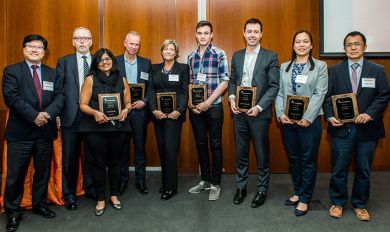Two cancer center members were among seven selected for the third round of the Daedalus Fund for Innovation awards, an innovative Weill Cornell Medicine program that helps advance promising applied and translational research projects and emerging technologies that have commercial potential. The projects are wide ranging, designed to address patient needs in areas ranging from newborn medicine to cancer and infectious disease, brain injury and chronic illness.
The researchers will each receive up to $100,000 for a period of one year to fund proof-of-concept studies that may help translate their early-stage discoveries into effective treatments for patients. The fund’s Scientific Advisory Committee, comprised of seasoned technology analysts from the biopharmaceutical and venture capital industries, selected the projects from 22 applications.
“The most challenging time for translational research is the period after initial discovery, in what is known as the ‘pre-competitive’ space, when investigators need to develop validation data in order to attract partners and investment from industry and/or the venture capital community,” said Larry Schlossman, managing director of BioPharma Alliances and Research Collaborations at Weill Cornell Medicine, who manages the Daedalus Fund. “The Daedalus initiative is designed to bridge the ‘development gap’ by providing philanthropic support at this critical juncture.”
- Dr. Lewis Cantley, the Meyer Director of the Sandra and Edward Meyer Cancer Center and a professor of cancer biology in medicine, is working to develop drug-like small molecules that block anabolic metabolism in triple negative breast cancer and non-small cell lung cancer — two aggressive malignancies with poor prognoses. Targeting serine synthesis could represent an effective treatment strategy for the cancers.
- Dr. Olivier Elemento, a Walter B. Wriston Research Scholar and associate professor of computational genomics in computational biomedicine and of physiology and biophysics, and his team have pioneered an experimentally validated artificial intelligence (AI)-guided approach called BANDIT (Bayesian ANalysis to determine Drug Interaction Targets). BANDIT uses big data to predict which protein targets small molecules will bind to in cells with 90 percent accuracy. This technology may dramatically speed up drug discovery, improve scientists’ ability to determine which diseases a drug would effectively treat, and identifies new ways to use existing drugs through the discovery of new unanticipated targets. Dr. Elemento hopes to expand BANDIT, which uses more than 20 million data points, so that he can identify new small molecules targeting relevant therapeutic targets in oncology, neurological and cardiovascular diseases, and expand the algorithms by integrating new data types into the AI engine.



